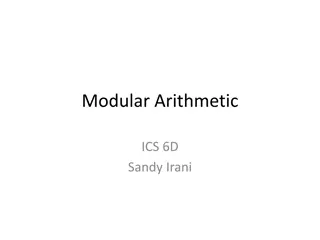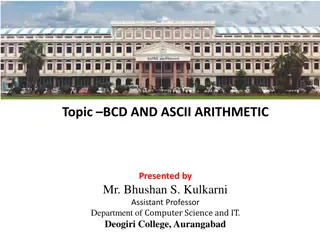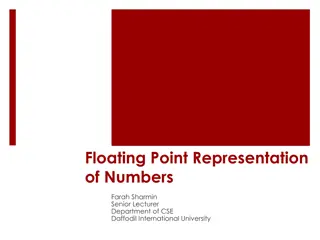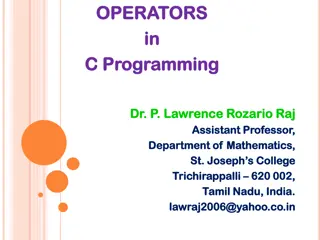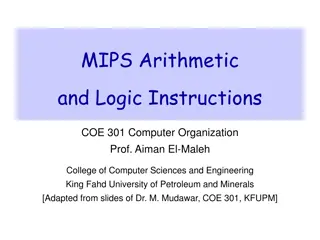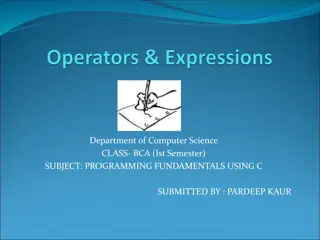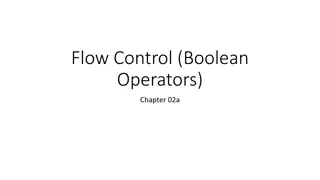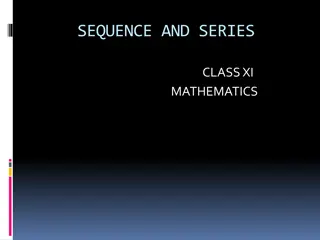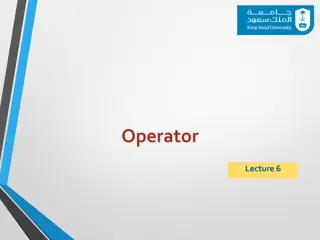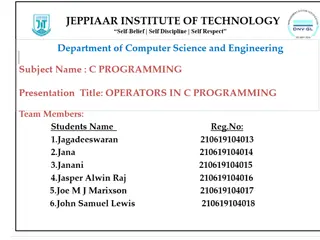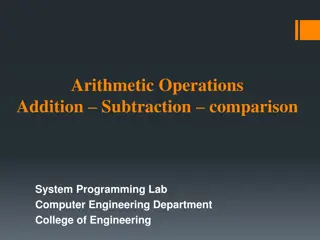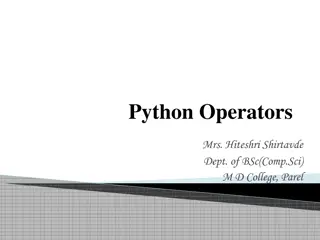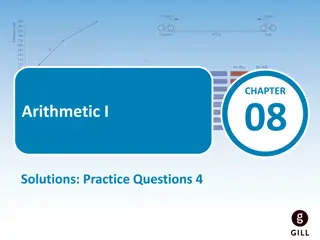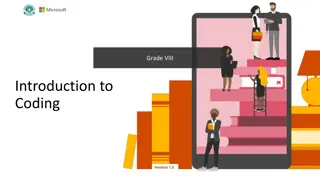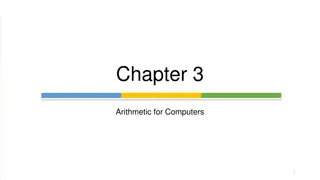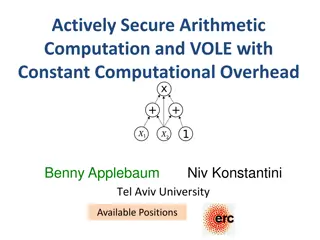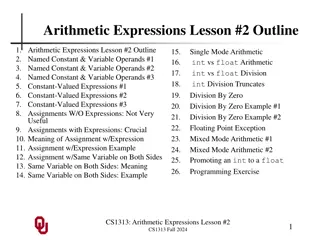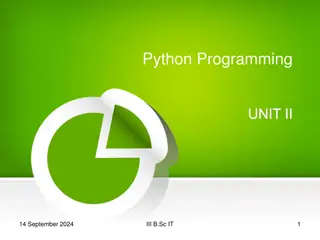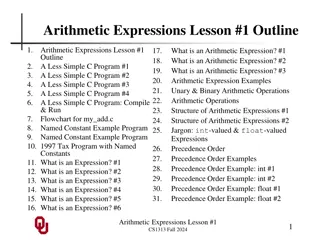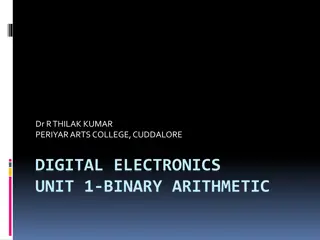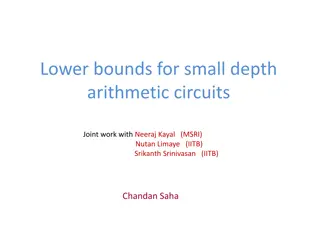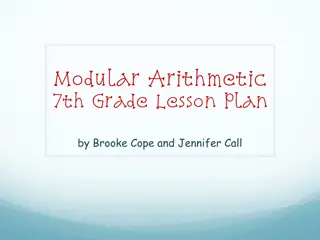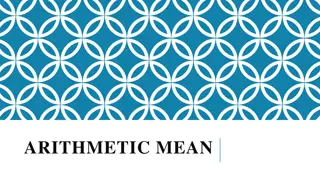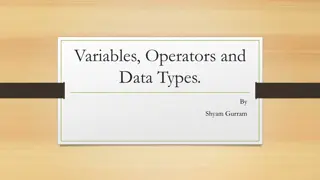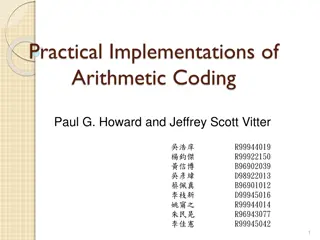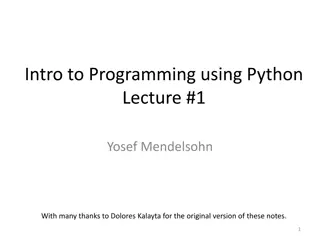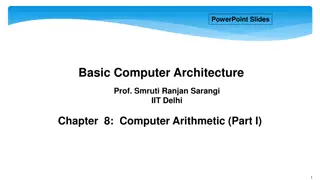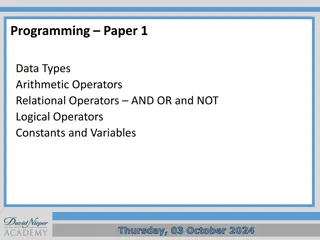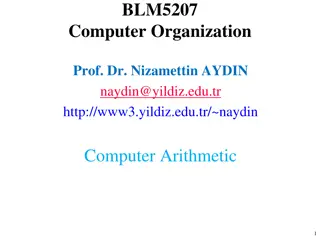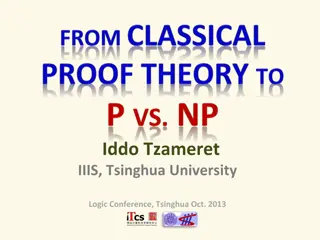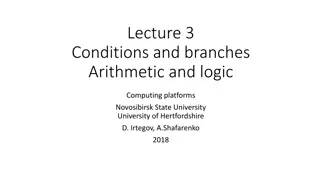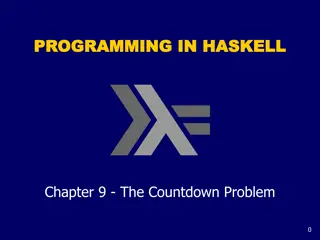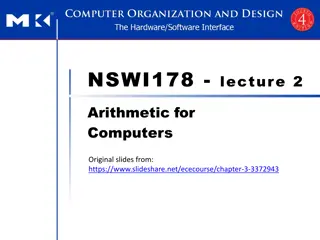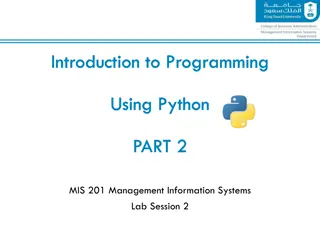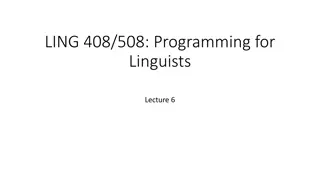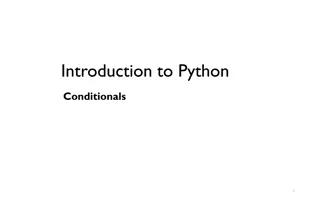Cognitive Load Classification with 2D-CNN Model in Mental Arithmetic Task
Cognitive load is crucial in assessing mental effort in tasks. This paper discusses using EEG signals and a 2D-CNN model to classify cognitive load during mental arithmetic tasks, aiming to optimize performance. EEG signals help evaluate mental workload, although they can be sensitive to noise. The
0 views • 19 slides
Modular Arithmetic and Rings in Mathematics
Exploring the concepts of modular arithmetic and rings in mathematics, including properties, operations, and examples. Learn how modular arithmetic simplifies computations and how rings define closed mathematical systems with specific laws and identities.
6 views • 14 slides
BCD and ASCII Arithmetic in 8086 Assembly Language
BCD (Binary-Coded Decimal) and ASCII (American Standard Code for Information Interchange) are key concepts in 8086 assembly language for numerical and character manipulations. BCD Arithmetic involves addition and subtraction techniques using instructions like DAA and DAS. The adjustment instructions
1 views • 21 slides
Road Transport Safety Standardization: The Role of the Corps Transport Standardization Officer
The presentation highlights the Road Transport Safety Standardization policy and the role of the Corps Transport Standardization Officer in regulating fleet operators, ensuring safe transportation operations, and promoting a culture of safety consciousness. It covers the functions of the officer, im
1 views • 13 slides
Floating Point Representation of Numbers
Floating point representation is crucial in computer arithmetic operations. It involves expressing real numbers as a mantissa and an exponent to preserve significant digits and increase the range of values stored. This normalized floating point mode allows for efficient storage and manipulation of r
0 views • 12 slides
Arithmetic Operators in C Programming
C programming language provides various arithmetic operators such as addition, subtraction, multiplication, division, and modulo division. Integer division truncates any fractional part, while modulo division produces the remainder of an integer division. When operands in an arithmetic expression ar
1 views • 18 slides
Overview of MIPS Arithmetic and Logic Instructions in COE 301
MIPS Architecture consists of R-Type and I-Type instruction formats for arithmetic, logical, shift, and immediate constant operations. It includes a variety of general-purpose registers and specific units for execution, floating-point operations, and memory handling. The presentation outlines the st
2 views • 29 slides
Introduction to Programming Fundamentals in C
Understanding operators in C programming is essential for performing mathematical and logical operations. This content covers various types of operators such as arithmetic, relational, logical, assignment, increment, decrement, conditional, bitwise, and special operators in C. It explains their func
0 views • 23 slides
Boolean Operators and Control Flow in Programming
Explore the world of Boolean operators and control flow in programming with this detailed chapter. Learn about comparison operators, boolean values, and the logical operators and, or, and not. Understand how these concepts are used to control the flow of your code through practical examples. Dive in
1 views • 10 slides
Sequences and Series in Mathematics
Sequences and series are fundamental concepts in mathematics, with sequences consisting of terms denoted as a1, a2, a3, ... and series involving the sum of terms in arithmetic and geometric progressions. Learn about arithmetic progression, geometric progression, terms, and formulas for finding sums
2 views • 11 slides
Operators in C++ Programming
Explore the different types of operators in C++ such as arithmetic, relational, and logical operators. Learn how these operators work and their specific use cases in programming. Gain insight into examples and descriptions of each operator type, enhancing your understanding of C++ programming concep
4 views • 8 slides
Arithmetic, Increment, and Decrement Operators in C Programming
Explore different types of operators in C programming like arithmetic operators for mathematical operations, increment and decrement operators for changing operand values, assignment operators for assigning values to variables, and relational operators for checking relationships between operands. Se
1 views • 14 slides
Overview of 8086 Assembly Language Arithmetic Operations
The 8086 assembly language provides instructions for arithmetic operations such as addition, subtraction, and comparison. These operations are essential for manipulating data in memory and registers. The instructions support various operand types, including registers, memory locations, and immediate
3 views • 24 slides
Python Operators: Arithmetic, Comparison, and Assignment
Python language supports various types of operators such as arithmetic operators for addition, subtraction, multiplication, division, modulus, exponent, and floor division. It also includes comparison operators to check equality, inequality, greater than, less than, greater than or equal to, and les
1 views • 11 slides
Arithmetic Practice Questions and Currency Conversions
Practice questions involving currency conversions and arithmetic calculations are provided in the content. Various scenarios are presented, such as determining costs in different currencies, finding exchange rates, and comparing prices in different countries based on exchange rates. The questions re
3 views • 25 slides
Introduction to Coding Ethics and Control Structures
Explore the fundamental concepts of coding ethics, including respect for privacy and confidentiality. Dive into control structures in programming, such as conditionals, logical operators, and relational operators. Gain insights into different types of control structures like sequential, selection/co
0 views • 44 slides
Arithmetic Operations for Computers
The chapter delves into the fundamentals of arithmetic for computers, covering operations on integers, dealing with overflow, handling floating-point real numbers, and more. It explores addition, subtraction, multiplication, and division in detail, showcasing examples and techniques for efficient co
4 views • 18 slides
Challenges and Implications of Labor Shortages in the Restaurant Industry
Labor shortages in the restaurant industry, exacerbated by the COVID-19 pandemic, have led to operators facing challenges such as reduced hours of operation. To attract employees, operators are offering increased wages and benefits. The future implications include potential increases in menu prices
0 views • 8 slides
Actively Secure Arithmetic Computation and VOLE Study
Exploring actively secure arithmetic computation and VOLE with constant computational overhead at Tel Aviv University. Understanding how functions are represented in secure computation using arithmetic circuits over boolean circuits. Efficiently evaluating arithmetic circuits over large finite field
0 views • 36 slides
Arithmetic Expressions and Constants in Programming
Learn about the importance of named constants and variables in arithmetic expressions, how to perform assignments with and without expressions, and the implications of working with integer and floating-point arithmetic in programming. Explore examples and exercises to enhance your programming skills
0 views • 26 slides
Python Programming Expressions and Arithmetic Operators Overview
Learn about expressions, arithmetic operators, value combinations with operators, operator precedence and associativity in Python programming. Understand arithmetic operations, variable assignments, common errors, and examples highlighting key concepts such as unary and binary operators. Enhance you
0 views • 15 slides
Arithmetic Expressions in C Programming
This lesson outlines the basics of arithmetic expressions in C programming, focusing on how to perform unary and binary arithmetic operations. It covers the structure of arithmetic expressions, precedence order, and examples to illustrate these concepts. The provided C program, 'my_add,' demonstrate
0 views • 31 slides
Introduction to Binary Arithmetic for Digital Electronics
Binary arithmetic is fundamental in digital electronics, involving addition, subtraction, and multiplication of binary numbers. This guide explains the rules and examples of binary arithmetic operations, such as binary addition and subtraction, along with detailed steps and illustrations for better
0 views • 21 slides
Lower Bounds for Small Depth Arithmetic Circuits
This work explores lower bounds for small-depth arithmetic circuits, jointly conducted by researchers from MSRI, IITB, and experts in the field. They investigate the complexity of multivariate polynomials in arithmetic circuits, discussing circuit depth, size, and the quest for an explicit family of
0 views • 114 slides
Modular Arithmetic and Time Concepts in 7th Grade Math
Delve into the world of modular arithmetic and time calculations with this 7th-grade lesson plan. Students will learn how to determine future times based on modular arithmetic principles, model different time scenarios, and understand concepts like congruence in time calculations. Through engaging a
0 views • 20 slides
Arithmetic Mean Calculation Methods
Arithmetic mean can be calculated in individual, discrete, and continuous series. In individual series, each item is listed separately, while in discrete and continuous series, items are grouped with frequencies. The mean can be computed using formulas tailored to each type of series, including meth
0 views • 4 slides
Variables, Operators, and Data Types in PHP
Explore the rules for defining variables in PHP, including naming conventions and case sensitivity. Learn about user-defined variables, scalar vs. compound variables, and the process of declaring and assigning values. Dive into PHP operators, such as arithmetic, assignment, comparison, increment/dec
0 views • 22 slides
Practical Implementations of Arithmetic Coding
Explore the practical implementations, advantages, and disadvantages of arithmetic coding in this informative guide. Learn about the basic algorithm, dynamic interval expansion, integer arithmetic coding, and methods to improve the speed of arithmetic coding. Dive deep into encoding algorithms, exam
0 views • 78 slides
Introduction to Python Programming: Basics and Arithmetic Operations
Learn the fundamentals of Python programming with a focus on setting up the development environment, understanding the Python shell, working with arithmetic expressions, data types, and numerical operations. Explore operator precedence and solve simple arithmetic expressions to grasp the basics of P
1 views • 34 slides
Computer Arithmetic Basics: Addition, Multiplication, Division, and More
Delve into the fundamentals of computer arithmetic with concepts such as adding 1-bit numbers, half adders, full adders, equations, circuits, and the addition of n-bit numbers. Explore the intricacies of binary arithmetic operations and learn how computers perform calculations effectively.
0 views • 84 slides
Data Types, Arithmetic Operators, and Logical Operators in Programming
Learn about data types such as integers, real numbers, booleans, characters, and strings. Explore arithmetic operators including division, floor division, and modulus. Understand relational operators for comparisons and logical operators like AND and OR for decision making in programming. Avoid conf
0 views • 15 slides
Computer Arithmetic: ALU, Integer Representation, and Twos Complement
Exploring the fundamental concepts of computer arithmetic including the Arithmetic & Logic Unit (ALU), integer representation methods, and the Twos Complement system. Learn about sign-magnitude, characteristics of Twos Complement representation, benefits, negation techniques, and special cases in co
1 views • 57 slides
Bounded Arithmetic and Definable Functions in Complexity Theory
Bounded arithmetic, as explored in complexity theory, focuses on theories like PA but with restrictions on formulas. The comprehension axiom determines sets that can exist, and TC is a first-order arithmetic theory defining functions within a specific complexity class. The witnessing theorem in TC e
0 views • 16 slides
Key Concepts in AP Computer Science A Exam Review
Essential topics covered in AP Computer Science A Exam include identifiers, primitive data types, number representation, final variables, and arithmetic operators. Recognizing the basics, such as types, identifiers, operators, and control structures, is crucial for success in the exam. Understanding
0 views • 100 slides
Arithmetic and Logic Computing in CdM-8
Explore the fundamental concepts of arithmetic and logic computing, including conditions, branches, arithmetic instructions, logic instructions, shift and move instructions, and the practical applications of shift operations. Delve into CdM-8 flags semantics, C and unsigned subtraction/comparison, b
0 views • 14 slides
The Countdown Problem in Haskell Programming
The Countdown problem, popularized by a British television quiz show, challenges players to use given numbers and arithmetic operators to reach a target number. This Haskell programming chapter explores evaluating expressions, applying operators, and formalizing the problem. Learn how to construct e
0 views • 23 slides
Arithmetic Operations for Computers
Explore fundamental arithmetic operations for computers, including addition, subtraction, multiplication, and division. Learn about dealing with overflow, real numbers in floating-point representation, and strategies for optimizing arithmetic efficiency. Discover why carry propagation can be slow an
0 views • 36 slides
Python Programming Essentials: Basics, Operators, Expressions, and Control Flow
This segment delves into the fundamentals of Python programming with a focus on essential concepts such as comments, numbers, strings, variables, arithmetic operators, logical operators, order of execution, expressions, and control flow statements like conditional execution and looping. Learn about
0 views • 12 slides
Introduction to Shell Arithmetic and Command.bc for Linguists
Today's lecture covers shell arithmetic, positional parameters for shell scripts, making shell scripts executable, and using command.bc for mathematical computations in the shell environment. Examples and demonstrations on shell arithmetic, utilizing the 'expr' command, and leveraging 'bc' command f
0 views • 21 slides
Learning Python Conditionals and Operators
Explore comparison operators, boolean operations, operator precedence, and conditionals in Python. Learn how to use these concepts effectively to make decisions and control the flow of your programs. Understand the differences between assignment and equality operators, and master the usage of logica
0 views • 32 slides

